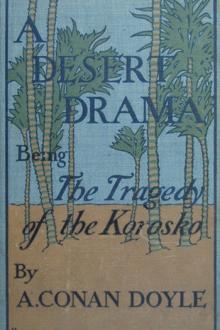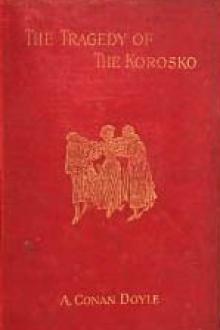A Desert Drama, Arthur Conan Doyle [best ebook reader for pc .txt] 📗

- Author: Arthur Conan Doyle
- Performer: -
Book online «A Desert Drama, Arthur Conan Doyle [best ebook reader for pc .txt] 📗». Author Arthur Conan Doyle
The chief had waited for the end of the explanation. Now he gave a brief order, and a negro stepped forward with a long, dull-coloured sword in his hand. The dragoman squealed like a rabbit who sees a ferret, and threw himself frantically down upon the sand once more.
“What is it, Cochrane?” asked Cecil Brown,—for the Colonel had served in the East, and was the only one of the travellers who had a smattering of Arabic.
“As far as I can make out, he says there is no use keeping the dragoman, as no one would trouble to pay a ransom for him, and he is too fat to make a good slave.”
“Poor devil!” cried Brown. “Here, Cochrane, tell them to let him go. We can't let him be butchered like this in front of us. Say that we will find the money amongst us. I will be answerable for any reasonable sum.”
“I'll stand in as far as my means will allow,” cried Belmont.
“We will sign a joint bond or indemnity,” said, the lawyer. “If I had a paper and pencil I could throw it into shape in an instant, and the chief could rely upon its being perfectly correct and valid.”
But the Colonel's Arabic was insufficient, and Mansoor himself was too maddened by fear to understand the offer which was being made for him. The negro looked a question at the chief, and then his long black arm swung upwards and his sword hissed over his shoulder. But the dragoman had screamed out something which arrested the blow, and which brought the chief and the lieutenant to his side with a new interest upon their swarthy faces. The others crowded in also, and formed a dense circle around the grovelling, pleading man.
The Colonel had not understood this sudden change, nor had the others fathomed the reason of it, but some instinct flashed it upon Stephens's horrified perceptions.
“Oh, you villain!” he cried, furiously.
“Hold your tongue, you miserable creature! Be silent! Better die—a thousand times better die!”
But it was too late, and already they could all see the base design by which the coward hoped to save his own life. He was about to betray the women. They saw the chief, with a brave man's contempt upon his stern face, make a sign of haughty assent, and then Mansoor spoke rapidly and earnestly, pointing up the hill. At a word from the Baggara, a dozen of the raiders rushed up the path and were lost to view upon the top. Then came a shrill cry, a horrible, strenuous scream of surprise and terror, and an instant later the party streamed into sight again, dragging the women in their midst. Sadie, with her young, active limbs, kept up with them as they sprang down the slope, encouraging her aunt all the while over her shoulder. The older lady, struggling amid the rushing white figures, looked with her thin limbs and open mouth like a chicken being dragged from a coop.
The chief's dark eyes glanced indifferently at Miss Adams, but gazed with a smouldering fire at the younger woman. Then he gave an abrupt order, and the prisoners were hurried in a miserable, hopeless drove to the cluster of kneeling camels. Their pockets had already been ransacked, and the contents thrown into one of the camel-food bags, the neck of which was tied up by Ali Wad Ibrahim's own hands.
“I say, Cochrane,” whispered Belmont, looking with smouldering eyes at the wretched Mansoor, “I've got a little hip revolver which they have not discovered. Shall I shoot that cursed dragoman for giving away the women?”
The Colonel shook his head.
“You had better keep it,” said he, with a sombre face. “The women may find some other use for it before all is over.”
CHAPTER V
The camels, some brown and some white, were kneeling in a long line, their champing jaws moving rhythmically from side to side, and their gracefully poised heads turning to right and left in a mincing, self-conscious fashion. Most of them were beautiful creatures, true Arabian trotters, with the slim limbs and finely turned necks which mark the breed; but amongst them were a few of the slower, heavier beasts, with un-groomed skins, disfigured by the black scars of old firings. These were loaded with the doora and the water-skins of the raiders, but a few minutes sufficed to redistribute their loads and to make place for the prisoners. None of these had been bound with the exception of Mr. Stuart,—for the Arabs, understanding that he was a clergyman, and accustomed to associate religion with violence, had looked upon his fierce outburst as quite natural, and regarded him now as the most dangerous and enterprising of their captives. His hands were therefore tied together with a plaited camel-halter, but the others, including the dragoman and the two wounded blacks, were allowed to mount without any precaution against their escape, save that which was afforded by the slowness of their beasts. Then, with a shouting of men and a roaring of camels, the creatures were jolted on to their legs, and the long, straggling procession set off with its back to the homely river, and its face to the shimmering, violet haze, which hung round the huge sweep of beautiful, terrible desert, striped tiger-fashion with black rock and with golden sand.
None of the white prisoners with the exception of Colonel Cochrane had ever been upon a camel before. It seemed an alarming distance to the ground when they looked down, and the curious swaying motion, with the insecurity of the saddle, made them sick and frightened. But their bodily discomfort was forgotten in the turmoil of bitter thoughts within. What a chasm gaped between their old life and their new! And yet how short was the time and space which divided them! Less than an hour ago they had stood upon the summit of that rock and had laughed and chattered, or grumbled at the heat and flies, becoming peevish at small discomforts. Headingly had been hypercritical over the tints of Nature. They could not forget his own tint as he lay with his cheek upon the black stone. Sadie had chattered about tailor-made dresses and Parisian chiffons. Now she was clinging, half-crazy, to the pommel of a wooden saddle, with suicide rising as a red star of hope in her mind. Humanity, reason, argument,—all were gone, and there remained the brutal humiliation of force. And all the time, down there by the second rocky point, their steamer was waiting for them,—their saloon, with the white napery and the glittering glasses, the latest novel, and the London papers. The least imaginative of them could see it so clearly: the white awning, Mrs. Shlesinger with her yellow sun-hat, Mrs. Belmont lying back in the canvas chair. There it lay almost in sight of them, that little floating chip broken off from home, and every silent, ungainly step of the camels was carrying them more hopelessly away from it. That very morning how beneficent Providence had appeared, how pleasant was life!—a little commonplace, perhaps, but so soothing and restful, And now!
The red head-gear, patched jibbehs, and yellow boots had already shown to the Colonel that these men were no wandering party of robbers, but a troop from the regular army of the Khalifa. Now, as they struck across the desert, they showed that they possessed the rude discipline which their work demanded. A mile ahead, and far out on either flank, rode their scouts, dipping and rising among the yellow sand-hills. Ali Wad Ibrahim headed the caravan, and his short, sturdy lieutenant brought up the rear. The main party straggled over a couple of hundred yards, and in the middle was the little, dejected clump of prisoners. No attempt was made to keep them apart, and Mr. Stephens soon contrived that his camel should be between those of the two ladies.
“Don't be down-hearted, Miss Adams,” said he. “This is a most indefensible outrage, but there can be no question that steps will be taken in the proper quarter to set the matter right. I am convinced that we shall be subjected to nothing worse than a temporary inconvenience. If it had not been for that villain Mansoor, you need not have appeared at all.”
It was shocking to see the change in the little Bostonian lady, for she had shrunk to an old woman in an hour. Her swarthy cheeks had fallen in, and her eyes shone wildly from sunken, darkened sockets. Her frightened glances were continually turned upon Sadie. There is surely some wrecker angel which can only gather her best treasures in moments of disaster. For here were all these worldlings going to their doom, and already frivolity and selfishness had passed away from them, and each was thinking and grieving only for the other. Sadie thought of her aunt, her aunt thought of Sadie, the men thought of the women, Belmont thought of his wife,—and then he thought of something else also, and he kicked his camel's shoulder with his heel until he found himself upon the near side of Miss Adams.
“I've got something for you here,” he whispered. “We may be separated soon, so it is as well to make our arrangements.”
“Separated!” wailed Miss Adams.
“Don't speak loud, for that infernal Mansoor may give us away again. I hope it won't be so, but it might. We must be prepared for the worst. For example, they might determine to get rid of us men and to keep you.”
Miss Adams shuddered.
“What am I to do? For God's sake, tell me what I am to do, Mr. Belmont! I am an old woman. I have had my day. I could stand it if it was only myself. But Sadie—I am clean crazed when I think of her. There's her mother waiting at home, and I——” She clasped her thin hands together in the agony of her thoughts.
“Put your hand out under your dust-cloak,” said Belmont, sidling his camel up against hers. “Don't miss your grip of it. There! Now hide it in your dress, and you'll always have a key to unlock any door.”
Miss Adams felt what it was which he had slipped into her hand, and she looked at him for a moment in bewilderment. Then she pursed up her lips and shook her stern, brown face in disapproval. But she pushed the little pistol into its hiding-place, all the same, and she rode with her thoughts in a whirl. Could this indeed be she, Eliza Adams, of Boston, whose narrow, happy life had oscillated between the comfortable house in Commonwealth Avenue and the Tremont Presbyterian Church? Here she was, hunched upon a camel, with her hand upon the butt of a pistol, and her mind weighing the justifications of murder. Oh, life, sly, sleek, treacherous life, how are we ever to trust you? Show us your worst and we can face it, but it is when you are sweetest and smoothest that we have most to fear from you.
“At the worst, Miss Sadie, it will only be a question of ransom,” said Stephens, arguing against his own convictions. “Besides, we are still close to Egypt, far away from the Dervish country. There is sure to be an energetic pursuit. You must try not to lose your courage, and to hope for the best.”
“No, I am not scared, Mr. Stephens,” said Sadie, turning towards him a blanched face





Comments (0)